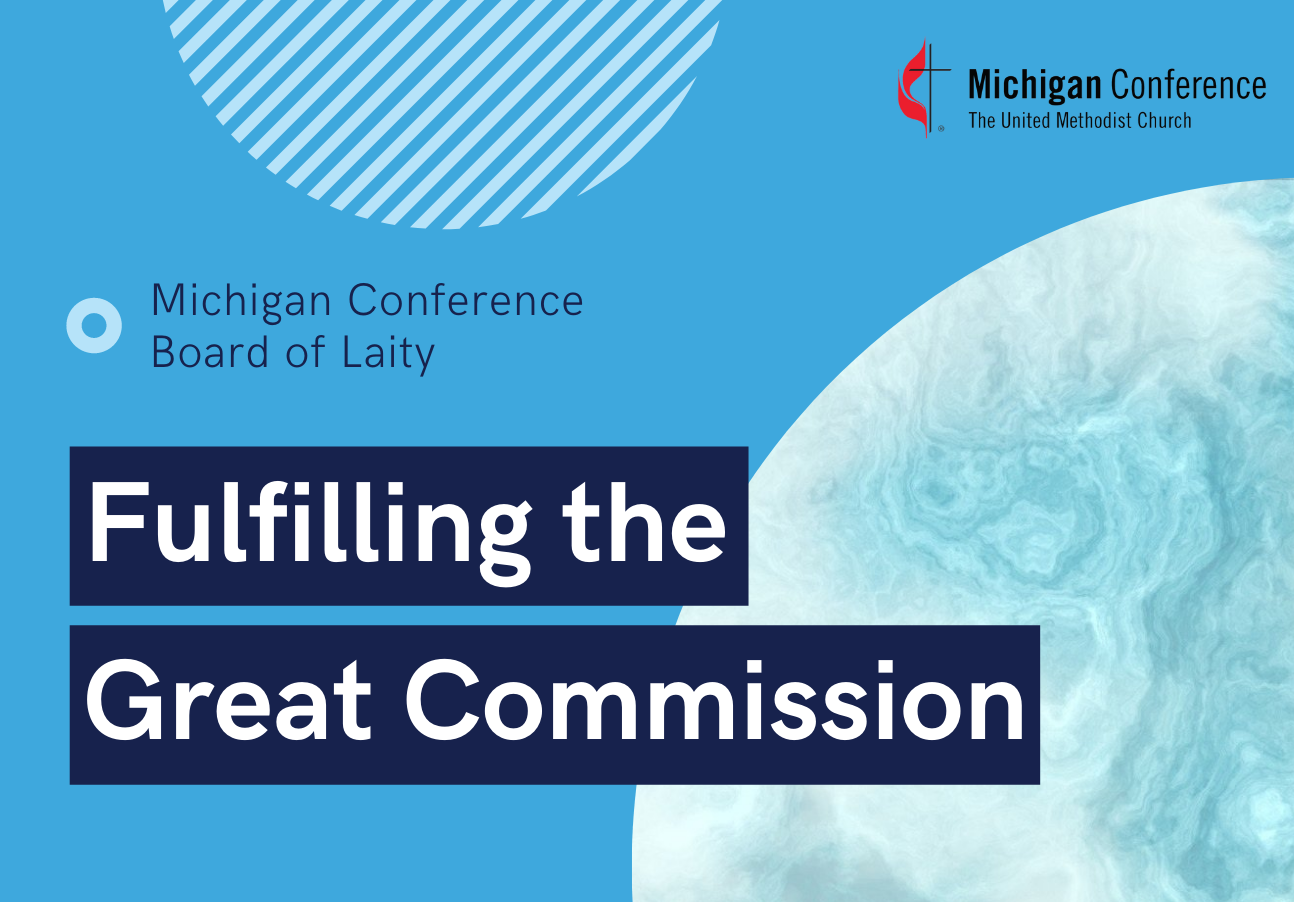Laura Witkowski asks, “It is possible that we have focused more on the making rather than the being” of discipleship? She invites all to a Zoom conversation on the Great Commission.
LAURA WITKOWSKI
Associate Director for Lay Leadership Development, Michigan Conference
Now the eleven disciples went to Galilee, to the mountain where Jesus told them to go. When they saw him, they worshipped him, but some doubted. Jesus came near and spoke to them, “I’ve received all authority in heaven and on earth. Therefore, go and make disciples of all nations, baptizing them in the name of the Father and of the Son and of the Holy Spirit, teaching them to obey everything that I’ve commanded you. Look, I myself will be with you every day until the end of this present age.” – Matthew 28:16-20
My guess is that a large percentage of United Methodists can recite the UM mission statement from memory. Say it with me: “to make disciples of Jesus Christ for the transformation of the world.” Although the text known as the Great Commission has been around for, well, a really long time, it is interesting to me that it has been The UMC mission statement only since 2000. (Fun fact: ‘for the transformation of the world’ was added in 2008 by General Conference action.)
It is also interesting to me that in many places I go, there is commonly an objection to the word “make.” The main grievance is that “we don’t like to make people do things. It’s up to them to choose.” I do not disagree, and it can certainly feel unpleasant to folks, especially those who have trauma from religion actually being forced upon them. Maybe it is useful to think about what word is more helpful than “make.” Some Bible translations say “teach,” some say “train,” and some say “disciple.”

On a day when I am not my best self, I can hear this criticism as another distraction of why it is hard to follow Jesus and an excuse to stay comfortable while sharing the love of Jesus. On a good day, I can hear this opposition as an opening to reframe. It seems obvious that the Great Commission is not an instruction or command of those who are not disciples of Jesus, it’s ours. Jesus did not share this with a gathered crowd, he shared this with the disciples. It is our work to do, not anyone else’s. The Great Commission “makes” the disciples teach and train and disciple others. Using the verb “make” is what makes the statement a command or commission.
Personally, I have become more and more interested in how we are being disciples. It is possible that we have focused more on the making rather than the being. If I am not grounded in the teachings and example of Jesus, why would anyone else be? If I am not doing the work on my own intercultural competency and biases, why would anyone else? If I am not loving my neighbor, why would anyone else? If I am not engaged in spiritual practices, why would anyone else? I hope that we have not been so bothered (not the good kind of bothered) by the word “make” that we have forgotten about actually “being” a disciple.
What does the Great Commission mean to you? To me, the Great Commission is another way we are called into community. We cannot fulfill it by being alone and in isolation, Jesus was clear on that. It must be in community with others. It calls us to share the love of Jesus and set aside being comfortable. Yes, “making disciples of Jesus Christ for the transformation of the world” can get uncomfortable and sticky and that is what makes it worth it. It is the how of our “why, how, what” as Christians and United Methodists. In my younger days, while memorizing The UMC mission statement, I would forget the reminder in the last few words that Jesus is with us until the end. It’s ongoing, never-ending and Jesus is in it for the long haul.
If you are looking for continued reflection and more discussion on the Great Commission, I hope you’ll participate on February 26 at 9:00 am in a webinar, Fulfilling the Great Commission: We Are All Ministers. The Board of Laity is excited to offer an online event to equip and challenge laypersons in Michigan to live out the call of The Great Commission in Matthew 28:19-20. It will include a keynote address by Certified Lay Minister, Sharon Appling, a panel discussion with both lay and clergy/pastor perspectives, and time in discussion groups with each other. Registration is required to receive the Zoom link.
I am so grateful for the Board of Laity and their work to put this event together. Sharon Appling is a gift in this conference, and the planning team is excited for everyone to receive what she shares with us. Although the focus is on laity, anyone is welcome to join.
Just be sure to register here by February 23.
Last Updated on September 20, 2022

